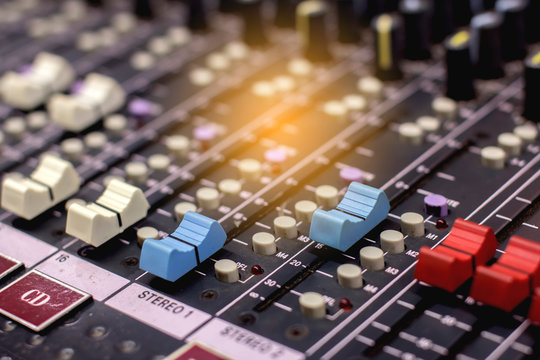Music production is a fascinating and rewarding field that offers endless opportunities for creative expression. If you’re passionate about music and have a talent for producing high-quality sound, then you already have what it takes to succeed in this industry. But with so many different career paths to choose from, it can be challenging to figure out which one is right for you. Are there Jobs for Music Production? In this post, we’ll explore some of the most lucrative jobs in music production and help you unleash your potential as a professional in this exciting field. Get ready to discover new possibilities and take your career to the next level!
Table of Contents

Music Producer: The Role and Responsibilities Explained
Music Producer is a key player in the music industry, responsible for overseeing the entire music production process. They work with artists, songwriters, and engineers to create high-quality recordings that meet the artist’s vision. The role of a music producer involves managing budgets, scheduling recording sessions, hiring session musicians, and overseeing mixing and mastering. A music producer must have a keen ear for sound and be able to provide constructive feedback to artists and engineers. They must also be knowledgeable about the latest recording technology and software. To become a successful music producer, one must have excellent communication skills, strong leadership qualities, and a passion for music. A degree in music production or related field can be helpful but is not always necessary as experience and connections can be just as valuable in this industry.

Top 5 Jobs in the Music Industry for Aspiring Music Producers
Jobs for music production are not limited to producing music in a studio. Aspiring music producers can find various opportunities in the industry, including working as A&R coordinators, mixing and mastering engineers, composers, and more.
Film scoring is one of the lucrative jobs for music production, which offers exciting opportunities to work with directors and sound designers on movies, TV shows or video games. Another option is becoming an audio engineer for concerts or live events where you would be responsible for setting up equipment and managing sound levels during performances. If want more creative freedom then composing jingles that play on radio or TV ads could also be your niche.
Many musicians today prefer being their own producer so there’s a demand arising in freelance work too. With technical advancements it’s possible to work with clients from all around the world using remote collaboration software. Some freelancers prefer to take project-specific contracts while some deal with retainer-based agreements where they act as long-term consultants – this approach can offer stability while still leaving time free for personal projects.
Whatever your preferred role may be, explore different avenues within jobs related to music production by networking with peers through social media platforms like LinkedIn groups or attending conferences such as NAMM Show or AES conference that always have new products and services showcased along with potential employers looking out!

Freelancing as a Music Producer: Pros, Cons, and How to Get Started
Freelancing as a music producer can be a great way to gain experience and build your portfolio. However, it’s important to understand the pros and cons before diving in. On the positive side, freelancing allows you to have more control over your schedule and choose the projects you work on. You also have the potential to earn more money per project than you would working for a company. On the other hand, freelancing can be unpredictable and may require more effort to find clients and market yourself. To get started, create a website or social media presence to showcase your work and reach out to potential clients. Networking with other professionals in the industry can also lead to new opportunities. Overall, freelancing can be a rewarding option for those looking for flexibility and autonomy in their music production career.

Inside Look: Working at Recording Studios as a Sound Engineer or Technician
The Role of a Sound Engineer in Music Production
The Role of a Sound Engineer in Music Production involves ensuring that the sound quality of a recording is top-notch. They work closely with music producers and artists to achieve the desired sound. A sound engineer is responsible for setting up and operating recording equipment, mixing and mastering tracks, and troubleshooting technical issues that may arise during recording sessions. They must have a keen ear for detail and be proficient in using digital audio workstations (DAWs) and other recording software. The ability to communicate effectively with producers, artists, and other team members is also crucial for success in this role. Overall, a sound engineer plays a vital role in creating high-quality music productions.
Essential Skills and Qualities for a Successful Career in Sound Engineering
To succeed as a sound engineer or technician in a recording studio, technical proficiency and attention to detail are crucial. A sound engineer must have a deep understanding of sound equipment, software, and signal flow. They should also possess excellent communication skills to work effectively with artists, producers, and other team members. Being able to multitask and work under pressure is also essential in this fast-paced environment. Additionally, having a creative mindset and the ability to think outside the box can help set you apart from other candidates. Continuous learning and staying up-to-date with industry trends can also help advance your career in music production.
A Day in the Life of a Recording Studio Technician
As a recording studio technician, your main responsibility is to ensure that all equipment is functioning properly and the sound quality is up to par. You will be responsible for setting up microphones, mixing boards, and other recording equipment. You will also work closely with music producers and artists to ensure that their vision is being realized. Attention to detail and technical expertise are crucial in this role. You may work long hours, especially during recording sessions, but the satisfaction of producing high-quality recordings makes it all worth it.
Advancements and Opportunities for Growth as a Sound Engineer or Technician
As a sound engineer or technician working at a recording studio, there are various opportunities for growth and advancement. One way to advance is by specializing in a particular area such as mixing, mastering, or sound design. Acquiring new skills through training programs and workshops can also help you move up the ladder. Another way to grow is by networking with industry professionals and building relationships with clients. Staying up-to-date with the latest technology and software is also crucial in this field. With dedication and hard work, sound engineers and technicians can progress to become studio managers or even start their own recording studios.

From the Studio to the Stage: Careers in Live Event Production and Audio Technology
Live event production and audio technology are two exciting career paths for those interested in music production. As a live event producer, you’ll be responsible for managing the technical aspects of concerts, festivals, and other live performances. This includes setting up sound systems, lighting, and video equipment, as well as coordinating with performers and other staff members. You’ll need to have a strong understanding of audio technology and be able to troubleshoot any issues that arise during the event.
Alternatively, you could pursue a career in audio technology by working for companies that develop audio equipment or software. This could involve designing new products, testing prototypes, or providing technical support to customers. You’ll need to have a deep knowledge of audio engineering principles and be able to stay up-to-date with the latest industry trends.
Both of these career paths offer exciting opportunities for those with a passion for music production. Whether you prefer the fast-paced environment of live events or the technical challenges of audio technology development, there’s sure to be a job that’s right for you.
In conclusion, music production is a dynamic and exciting industry with endless possibilities for those who have the passion and talent for it. Whether you’re interested in working as a music producer, sound engineer or technician, or pursuing a career in live event production, there are plenty of opportunities waiting for you. With dedication and hard work, you can unleash your potential and turn your love of music into a rewarding profession.
If you want to learn more about careers in the music industry or tips on how to succeed as a music professional, be sure to check out our other content here at [website name]. We hope this article has inspired you to pursue your dreams and take the first step towards an exciting career in music production!
Answers
Who hires music producers?
Music producers are hired by recording studios, record labels, and independent artists.
What skills do you need for music production jobs?
Music production jobs require skills such as audio engineering, music theory, and software proficiency.
How do you get a job in music production?
To get a job in music production, you can start by interning at a recording studio or gaining experience through freelance work.
Who can benefit from music production jobs?
Anyone with a passion for music and a talent for audio engineering can benefit from music production jobs.
What is the average salary for music producers?
The average salary for music producers ranges from $30,000 to $100,000 per year depending on experience and industry.
How can I overcome the objection of lack of formal education?
While a degree in music production is helpful, it’s not always necessary. Gaining experience through internships and freelance work can be just as valuable.

![No blues in these grooves -[ HMM ]-](https://audioblogpros.com/wp-content/uploads/2023/03/No-blues-in-these-grooves-HMM-.jpg)